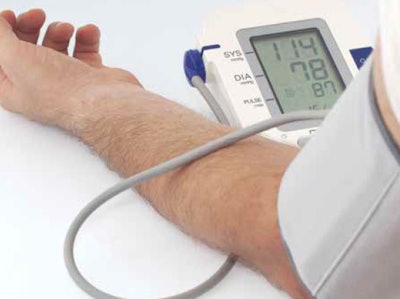 With a portable blood pressure monitor, available at pharmacies, you can track your pressure while on the road. AHA has redefined high blood pressure as readings of 130 and higher for the top measurement (a heartbeat’s pressure on the arteries), and readings of 80 or higher for the bottom measurement (pressure on the arteries between heartbeats). AHA considers a normal blood pressure is 120/80 or below.
With a portable blood pressure monitor, available at pharmacies, you can track your pressure while on the road. AHA has redefined high blood pressure as readings of 130 and higher for the top measurement (a heartbeat’s pressure on the arteries), and readings of 80 or higher for the bottom measurement (pressure on the arteries between heartbeats). AHA considers a normal blood pressure is 120/80 or below.Keeping a healthy heart isn’t easy when a large portion of your day involves staying safe amid challenging traffic situations and dealing with delays and other annoying circumstances beyond your control. That stress, along with the poor diet and sedentary nature common among truckers, can lead to high blood pressure and heart disease.
Recognizing the symptoms of high blood pressure and a heart attack, and knowing how to control your risk factors, can help you avoid heart-related emergencies and prolong your driving career.
The American Heart Association says nearly half of American adults have high blood pressure, or hypertension. It develops slowly and typically does not have obvious symptoms.
When not controlled, high blood pressure can cause a heart attack, a stroke, kidney disease, vision loss, peripheral artery disease and other serious conditions. This condition cannot be cured, but it can be managed through lifestyle changes and, if applicable, prescribed medications.
In addition to high blood pressure, other risk factors for a heart attack include high blood cholesterol, physical inactivity, being overweight, being diabetic, stress, excessive alcohol consumption, increasing age and having a family history of heart disease. Men have a greater risk for heart attack than women and have heart attacks earlier in life, AHA says.

Most heart attacks begin slowly, but they can be sudden and intense. Call 911 if you feel discomfort in the center of the chest that lasts longer than a few minutes. It may go away and come back and could feel like an uncomfortable pressure, squeezing, fullness or pain. Other symptoms are discomfort in other upper body areas such as the arms, back, neck, jaw or stomach; shortness of breath with or without chest discomfort; and a cold sweat, nausea or lightheadedness.
Treatment and Prevention
If you suspect you have high blood pressure, that warrants a conversation with your doctor. For managing the condition, AHA recommends eating a balanced low-salt diet, limiting alcohol consumption, exercising regularly, managing stress, maintaining a healthy weight, taking prescribed medications properly and not smoking.
Healthy eating, especially over the road, can be a complicated task when restaurant and cooking options are limited. Buying a slow cooker designed for in-cab use can enable you to prepare healthy meals with minimal effort. That also gives you control over how much salt is used.
Even when you don’t have access to a gym or exercise equipment, there are easy ways to stay physically active during your downtime. Walking can be done anywhere you park. Most body-weight exercises, such as push-ups and squats, can be done inside a sleeper.
AHA recommends identifying your risk factors early and doing what you can to control them. Also recommended is having potential heart attack symptoms checked out even if you don’t think you’re having a heart attack.










